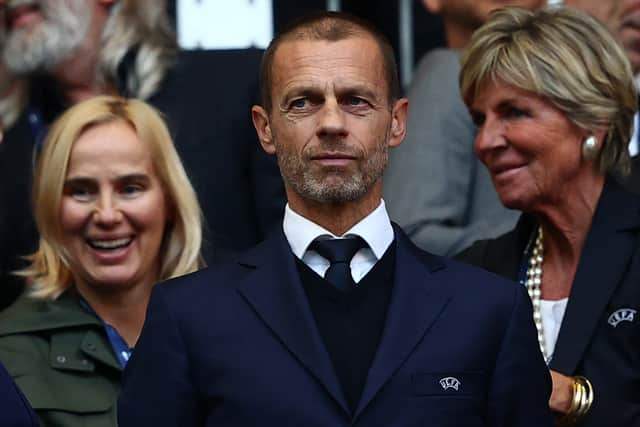How the new Champions League format could affect the likes of Liverpool, Man Utd, Arsenal, Man City and more
and live on Freeview channel 276
Changes to the format of the Champions League have been in the pipeline for some time, but the final format for the competition from the 2024/25 season has only been unveiled in the past week – and it’s both complicated and unpopular.
Europe’s premier competition will now have 36 teams – four more than it does at present – who will all be grouped together in a single league phase, rather than in the groups of four that we’re accustomed to. Each side will play eight games – four home and four away - with the top eight from the league table these games produce going through to the knockout stages, and the next sixteen competing in an extra play-off round to make it through to the round of 16. The bottom eight will be knocked out, and both the Europa League and Europa Conference League will follow the same format.


Advertisement
Advertisement
So far, so convoluted – and the confusion is not helped by UEFA referring to the idea as the “Swiss System”, a tournament format that already exists in games like chess, and which bears no resemblance to the new Champions League structure. It will unquestionably be harder to follow, and qualification from the first round will be much harder to parse as it unfolds, which may well generate less drama. It also generates an extra four games for sixteen clubs – and two more for all of them – which creates fresh scheduling headaches in an already packed fixture list. It’s hard to see the upside at first glance.
Where will the extra four clubs come from?
If there was any hope that the new format would open up more slots to teams from nations with less powerful leagues, then it was dashed by the announcement. Only one of the four extra places will go to a team from the Champions Path in qualification – the route taken by the winners of the less wealthy leagues in Europe.
A further additional slot will be offered to a team from the country who place fifth in UEFA’s national association ranking – otherwise known as the country co-efficients – which as it stands would mean one more high-placing league team from France. The two remaining spaces will be given each year to an extra team from the two countries who post the best combined finish in UEFA competitions – if the format change was taking place next year it would mean the fifth-placed team in the Premier League would qualify, alongside another club from the Netherlands.
Instead of spreading the opportunity to play at Europe’s top table wider, the new system only serves to further entrench the existing balance of power – which is presumably part of the intent. Creating more slots for the existing superclubs to reduce the risk of them missing out in any given season, and creating extra matches for them to rake revenue from, is one way of trying to satiate the clubs who were dead set on forming a Super League not so long ago. It will, at least, slightly mitigate the risk for existing big clubs of overspending and missing out on a financially ruinous qualification at a crucial time. Essentially, the format is custom-built to protect the existing order and the clubs who spend heavily on maintaining their part in it.
Who will play who?
Advertisement
Advertisement
UEFA has not yet announced how the new league structure will function in terms of a draw – it is likely that it will be drawn from pots, which two teams from each ‘tier’ of the club coefficients playing each other and then picking up the rest of their matches from teams in lower pots, but that is yet to be confirmed.
So the biggest clubs will still likely play at least one match against other recognised powerhouses, but overall the difficulty of their fixture lists will be diluted – again, designed to increase their chances of progression and maintain their financial strength over time. More games at this stage also reduces the chance of upsets derailing a big team’s bid for the title – which weren’t very high anyway, but are now lowered even further.
The additional games mean more income for both the clubs and UEFA, as it theoretically increases the value of advertising and broadcasting deals with the governing body, but it isn’t clear how these games will be crowbarred into already tight schedules.
UEFA’s announcement stated that the new format “confirms UEFA’s strong commitment to the principle of open competitions and sporting merit, while recognising the need to protect domestic leagues” but this is hardly good news for domestic FAs – not only do they have to try and fit an extra four games in for some teams when precious little room exists, but more games in the Champions League means more domestic matches in which clubs may field weaker sides. It also slightly reduces the jeopardy that’s so integral to the existing domestic structure of divisions like the Premier League – an extra Champions League spot reduces the chances of a big team missing out and will reduce the drama levels for several teams over the course of time. At least the extra slot won’t go to the same league every season, although the ‘big five’ will largely monopolise it.
Advertisement
Advertisement
The FA has yet to make any statement on whether the extra games will affect the domestic calendar, but with early-round FA Cup replays already sacrificed to the ever-growing demands of the schedule, competitions such as the League Cup will be at risk, and may at a minimum need reformatting. The extra strain also means that a winter break becomes even less likely, and demands on players may reach a breaking point, with injuries and exhaustion becoming an increasing issue.
What have UEFA said about the new format?
UEFA president Aleksander Čeferin is clearly pleased with the decision – although some elements of his statement may raise a few eyebrows.
“UEFA has clearly shown today that we are fully committed to respecting the fundamental values of sport” he said, “and to defending the key principle of open competitions, with qualification based on sporting merit, fully in line with the values and solidarity-based European sports model.”


Quite which “solidarity-based” model he is referring to is rather unclear, as the current state of domestic European football can better be described as predatory, with wealthy superclubs financially dominating lesser teams, building pan-global networks of feeder clubs to strengthen their positions and, in some countries such as Spain, dominating the wealth earned from broadcasting rights.
Advertisement
Advertisement
Čeferin continued: “I am really pleased that it was a unanimous decision of the UEFA Executive Committee, with the European Club Association, European Leagues and National Associations all agreeing with the proposal made. Another proof that European football is more united than ever.”
Given that we are only a couple of years on from the debacle of several of Europe’s richest clubs attempting to break away from the Champions League to form their own private members’ club, it’s hard to imagine that European football is at the peak of unity. Several of the clubs involved in the Super League still openly discuss it as a future option. This reformatting of Europe’s biggest club competition must be seen for what it is – an attempt to ward off the Super League by providing enrichment and protection to the biggest teams.
We want your feedback on 3 Added Minutes - details here
Perhaps that’s politically necessary – but there’s little doubt that this new system sells fans short, diluting the quality of the tournament and reducing the levels of excitement produced by the earlier stages of the competition. UEFA must also be wary – as FIFA will have to be as they expand the World Cup for their own financial reasons – that they do not dilute the product so much that viewership recedes. It is unlikely that even the wonkiest tournament format would drive viewers off entirely with football on such a high ebb globally, but the individual games becoming less valuable may push viewing figures down and, as such, see broadcasters and advertisers question the amount of money they throw at the game.
A lot of fans are unhappy with the proposals, whether it’s for sporting reasons or simply because the new format is so complicated – but whether they like it or not, UEFA is extremely unlikely to change their mind, and as the 2024/25 seasons rolls around - we’ll just have to get used to it.
